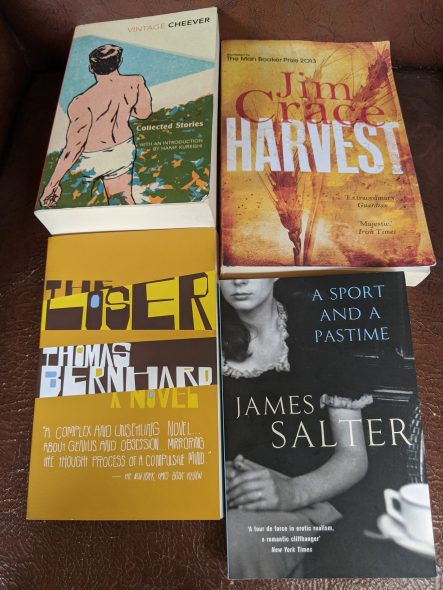
Is there a more magnificent collection of short stories than this 900 page monster Collected Stories by John Cheever? Before beginning, in my mind I’d confused Cheever for Raymond Carver, who I had mixed feelings about – his unsentimental, brusk (but highly acclaimed) shorts I’d read a decade ago and left me a bit cold. Once I realised Cheever was a different beast, I let these period pieces of the 50s and 60s wash over me. The word luminous (from the review on the back) comes to mind when thinking about these 60 short stories – so many of them unpredictable and odd little urban stories of the affluent suburban neighbourhoods of his upbringing. Kim looked him up and told me about a famous one of his “The Swimmer” before I’d read it, and partly spoiled it, but there were so many here that I loved, it was hard to pick a dud. Occasionally uncomfortable, like the male stalker in The Chaste Clarissa, an office dalliance gone wrong in The Five Forty Eight, and the mortified parents in Clancy in the Tower of Babel, there was also plenty of playful commentary on suburban ambition, and a wonderful lack of predictability all round. Probably my best read in years – I could do it all again now. 5 stars.
I haven’t read any other books by Jim Crace, but this one, Harvest is a lot like those of Geraldine Brooks thematically. I’m a bit confused about the exact era, but it seemed to be around the time (16th or 17th century) when enclosure was increasingly occurring, and more efficient agricultural practices were being enforced upon traditional farm workers in small villages across the UK. I thought it was a pretty successful novel, easy to read, and also staggeringly cruel in parts. 4 stars.
The podcast BackListed recommended Old Masters by Thomas Bernhard, but all I could seem to find was The Loser, which in hindsight was probably a better choice for me. From what I can tell, they are similar books, except the former is rantings about the petty smallness and inwardness of Austria seen through the eyes of some ageing art critics, and The Loser was also angry, but less easy to define, being more focused on the lives and achievements of Glenn Gould, Wertheimer and the unknown narrator, all virtuoso pianists. To say this is a swirling, circular monologue of a novel is an understatement, and any quick lookup / podcast tells that the author was known for being a difficult, death-obsessed and uncompromising. I don’t think I’ll read another one of his, but I still found it interesting if irrational and misanthropic. 4 stars.
I can’t resist the odd bit of eroticism and there’s no doubt that James Salter did it well in A Sport and a Pastime, however I found myself reading it in tiny sections, distracted by my phone, or by chess puzzles or Twitter. Just a total mismatch for my mood at the time, despite the writing being really good. To explain, after about 1/3 of the way in, the book mostly cycled between daily wake up morning sex, driving to the next French village, baths together, and then finding a nice place to have dinner. Worst of all, in the end, the handsome American just leaves and flies home, however somehow all parties are sated. 3.5 stars.